Henny Porten was the star of the silent mountain drama Die Claudi vom Geiserhof/Claudi of the Geiserhof (Rudolf Biebrach, 1917). This Messter Film production premiered at the Mozartsaal in Berlin, on 28 September 1917. The later director Karl Freund did the cinematography of the beautiful mountain landscapes.
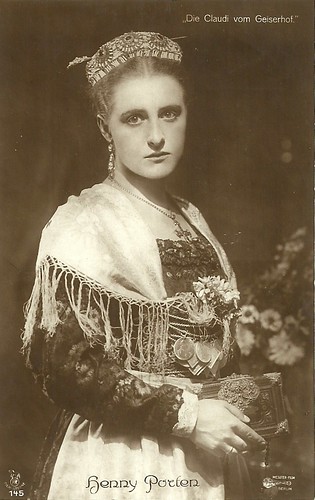
German postcard by Rotophot in the Film Sterne series, no. 145. Photo: Messter Film, Berlin. Publicity still for Die Claudi vom Geiserhof/Claudi of the Geiserhof (Rudolf Biebrach, 1917).
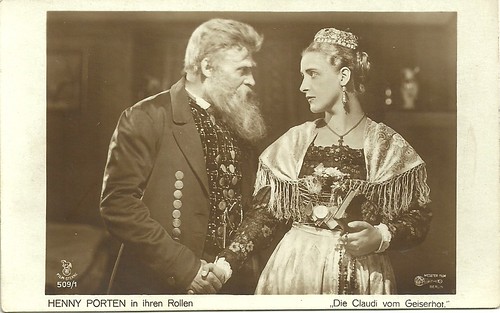
German postcard by Rotophot in the Film Sterne series, no. 509/1. Photo: Messter Film, Berlin. Publicity still for Die Claudi vom Geiserhof/Claudi of the Geiserhof (Rudolf Biebrach, 1917).
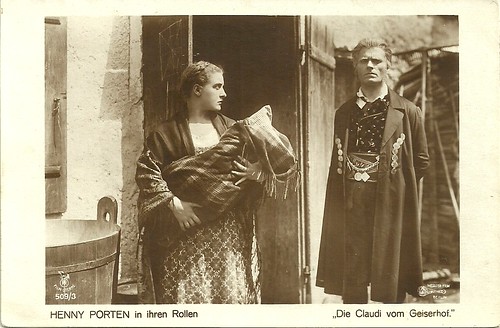
German postcard by Rotophot in the Film Sterne series, no. 509/3. Photo: Messter Film, Berlin. Publicity still for Die Claudi vom Geiserhof/Claudi of the Geiserhof (Rudolf Biebrach, 1917).
In Die Claudi vom Geiserhof (1917), simple but honest Claudi (Henny Porten) suffers under her grim and taciturn father (Eduard von Winterstein), who always had wanted a son instead of a daughter. The situation worsens when Claudi gets pregnant from the son (Paul Hartmann) of a rich farmer, who refuses to marry her.
Unable to stand the shame and scorn, the father kicks his daughter and her young baby out of the Geiserhof farm. The old farmhand Jörgl (Lupu Pick) and the father (Josef Klein) of the scoundrel who caused Claudi's misery prevent her from throwing herself from a cliff.
Years pass. Claudi has moved in with her lover's father, while the lover has left long ago as he disobeyed his father to marry the girl. Claudi's own father has become a recluse and misanthropist. When an avalanche buries him, Claudi returns to life. The lover's father offers to marry Claudi to turn her into a respectable woman, while Claudi's son manages to reconcile Claudi and her father, who miraculously has survived the avalanche.
When noticing this all, the lover repents and throws himself into an abyss on the spot where Claudi wanted to jump, together with her child.
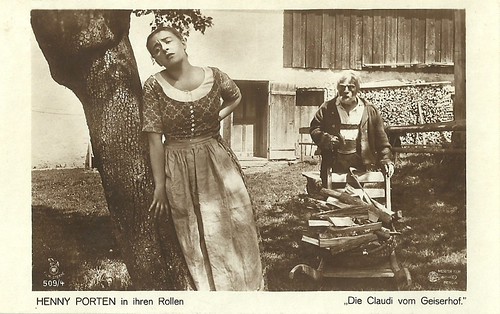
German postcard by Rotophot in the Film Sterne series, no. 509/4. Photo: Messter Film, Berlin. Publicity still for Die Claudi vom Geiserhof/Claudi of the Geiserhof (Rudolf Biebrach, 1917).
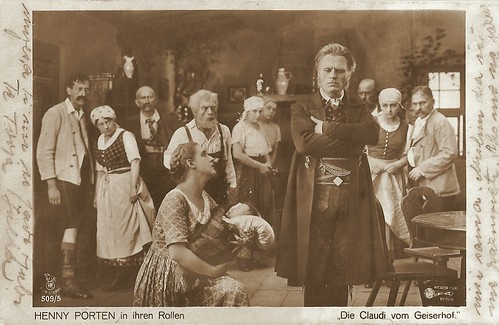
German postcard by Rotophot in the Film-Sterne, no. 509/5. Photo: Messter Film. Publicity still for Die Claudi vom Geiserhof/Claudi of the Geiserhof (Rudolf Biebrach, 1917).
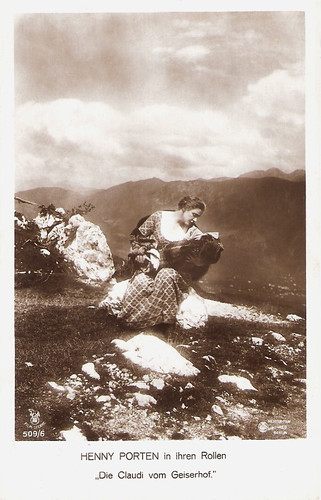
German postcard by Rotophot in the Film Sterne series, no. 509/6. Photo: Messter Film, Berlin. Publicity still for Die Claudi vom Geiserhof/Claudi of the Geiserhof (Rudolf Biebrach, 1917).
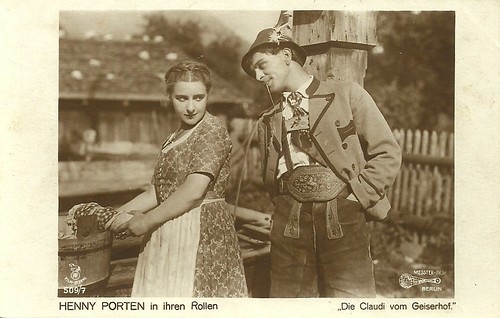
German postcard by Rotophot in the Film Sterne series, no. 509/7. Photo: Messter Film, Berlin. Publicity still for Die Claudi vom Geiserhof/Claudi of the Geiserhof (Rudolf Biebrach, 1917).
Sources: The German Early Cinema Database, Wikipedia (German) and IMDb.

German postcard by Rotophot in the Film Sterne series, no. 145. Photo: Messter Film, Berlin. Publicity still for Die Claudi vom Geiserhof/Claudi of the Geiserhof (Rudolf Biebrach, 1917).

German postcard by Rotophot in the Film Sterne series, no. 509/1. Photo: Messter Film, Berlin. Publicity still for Die Claudi vom Geiserhof/Claudi of the Geiserhof (Rudolf Biebrach, 1917).

German postcard by Rotophot in the Film Sterne series, no. 509/3. Photo: Messter Film, Berlin. Publicity still for Die Claudi vom Geiserhof/Claudi of the Geiserhof (Rudolf Biebrach, 1917).
Shame and scorn
In Die Claudi vom Geiserhof (1917), simple but honest Claudi (Henny Porten) suffers under her grim and taciturn father (Eduard von Winterstein), who always had wanted a son instead of a daughter. The situation worsens when Claudi gets pregnant from the son (Paul Hartmann) of a rich farmer, who refuses to marry her.
Unable to stand the shame and scorn, the father kicks his daughter and her young baby out of the Geiserhof farm. The old farmhand Jörgl (Lupu Pick) and the father (Josef Klein) of the scoundrel who caused Claudi's misery prevent her from throwing herself from a cliff.
Years pass. Claudi has moved in with her lover's father, while the lover has left long ago as he disobeyed his father to marry the girl. Claudi's own father has become a recluse and misanthropist. When an avalanche buries him, Claudi returns to life. The lover's father offers to marry Claudi to turn her into a respectable woman, while Claudi's son manages to reconcile Claudi and her father, who miraculously has survived the avalanche.
When noticing this all, the lover repents and throws himself into an abyss on the spot where Claudi wanted to jump, together with her child.

German postcard by Rotophot in the Film Sterne series, no. 509/4. Photo: Messter Film, Berlin. Publicity still for Die Claudi vom Geiserhof/Claudi of the Geiserhof (Rudolf Biebrach, 1917).

German postcard by Rotophot in the Film-Sterne, no. 509/5. Photo: Messter Film. Publicity still for Die Claudi vom Geiserhof/Claudi of the Geiserhof (Rudolf Biebrach, 1917).

German postcard by Rotophot in the Film Sterne series, no. 509/6. Photo: Messter Film, Berlin. Publicity still for Die Claudi vom Geiserhof/Claudi of the Geiserhof (Rudolf Biebrach, 1917).

German postcard by Rotophot in the Film Sterne series, no. 509/7. Photo: Messter Film, Berlin. Publicity still for Die Claudi vom Geiserhof/Claudi of the Geiserhof (Rudolf Biebrach, 1917).
Sources: The German Early Cinema Database, Wikipedia (German) and IMDb.
No comments:
Post a Comment